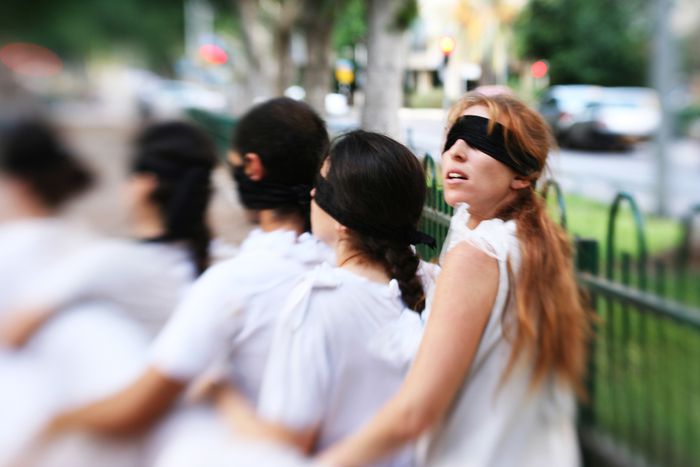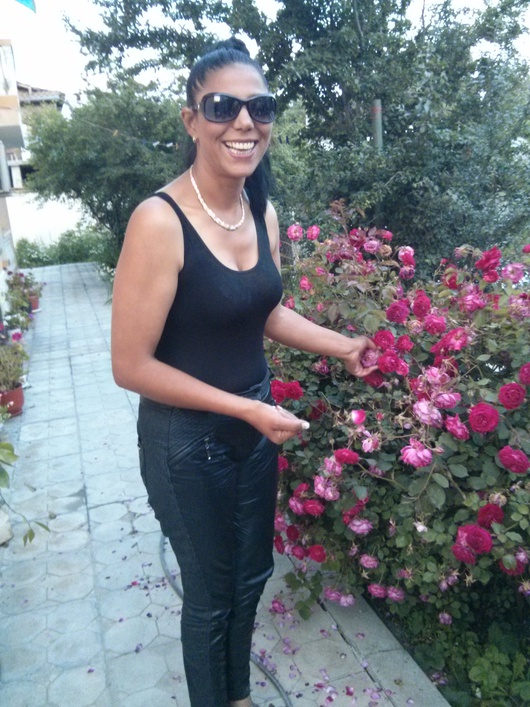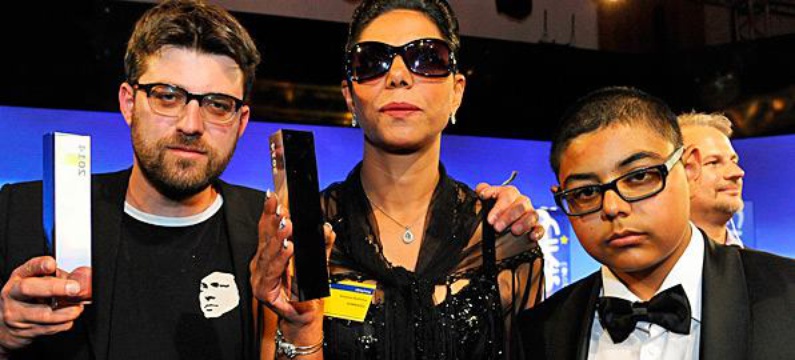
Kremena Budinova: Like the Country, Like the Roma
Published on
Kremena Budinova is a Bulgarian journalist of Roma origin with a long career in television, print media and radio. Born in the Fakulteta district in Sofia, Kremena lost her sight at the age of 14. Kremena proved to everyone, including herself, that it is possible for a blind person, stereotyped by her ethnicity, to become a television reporter.
“There is no ghetto in Bulgaria that I haven’t visited,” says Kremena Budinova, after she gives me a warm welcome to her house and leads me to the spacious garden. Kremena and her son built and furnished their new home, situated in one end of the Fakulteta district in Sofia, on their own.
“Mum made this,” says 13-year-old Ognyan Budinov, pointing to a masonry wall built of symmetrically arranged round stones. One cannot but feel impressed not only at the fact this wall was built by a woman, but also that this woman is visually impaired. Some time ago, Arte came to Bulgaria to shoot a film about Kremena and record the building of the house.
 Kremena doesn’t like stereotypes and vigorously neutralises them. “Definitions are illusive, I personally have no definition for myself,” she says when asked how she identifies herself. “I’ve been reporting on the topic for 17 years. Before that I worked as a publicist of various topics, but unfortunately, I’ve been labeled a 'Roma journalist', instead of a 'journalist'. It puts me in a frame.”
Kremena doesn’t like stereotypes and vigorously neutralises them. “Definitions are illusive, I personally have no definition for myself,” she says when asked how she identifies herself. “I’ve been reporting on the topic for 17 years. Before that I worked as a publicist of various topics, but unfortunately, I’ve been labeled a 'Roma journalist', instead of a 'journalist'. It puts me in a frame.”
Fakulteta
“Like the country, like the Roma,” states Kremena firmly, while focusing on sensitive issues such as the lack of education and jobs. She tells me that nothing in Fakulteta has changed over the years, how the substantial funds granted by EU institutions have disappeared. Kremena directs her criticism both at the Roma and state policies. People in the neighbourhood know by heart how much each political party paid them to vote during the EU elections.
In the midst of our conversation, loud music blares from a tape. Kremena and I exchange glances (I realised this can happen with a visually impaired person, as well). Not far from the house, there is a several-story white building from where waves of music flood the neighbouring shanties every evening. A boy from the neighbourhood explains: “this is a restaurant, sometimes a disco” and that everything in “there is made of gold.” Fakulteta, with its population of 45,000 people, has its sharp contrasts.
Untrue stereotypes
The house has a spacious garden with rose bushes and blooming trees. Kremena says that the Roma usually do not like gardens around their homes but prefer their backyards to be cemented instead, which is accepted socio-culturally as a sign of cleanness. When asked about the most untrue stereotypes about the Roma community, she starts enumerating.
“Children... People think that the Roma give birth because of social benefits. Well, it’s not true. How will they support themselves on these BGN 35? (Bulgarian Lev — Editor) The Roma love their house to be full of children, to be filled with happiness, it’s in their culture. However, a steady trend has emerged – the Roma have been giving birth to fewer children because of the crisis.”
Kremena points out the same trends exhibited by the Bulgarian population as a whole can be detected in the Roma minority: intensive immigration to the capital, impoverishment outside of it.
“There are no bigger patriots than the gypsy,” Kremena adds, saying the Roma wouldn’t emigrate usually, except for out of strong economic necessity. When asked about the number of Roma people in Bulgaria, she answers this issue is in itself dangerous because it creates “social tension”. According to her, the number of Roma people exceeds 800,000.
The support
 The broadcast about Roma issues has always been an external production, which means Kremena has to make a living by constantly making efforts to find new donors. NGOs have offered her the strongest support; BNT (Bulgarian national television — Editor) gives only airtime. At the award ceremony in Berlin, Kremena learns from her foreign colleagues that the existence of such broadcasts enjoys full support of national televisions in other EU countries.
The broadcast about Roma issues has always been an external production, which means Kremena has to make a living by constantly making efforts to find new donors. NGOs have offered her the strongest support; BNT (Bulgarian national television — Editor) gives only airtime. At the award ceremony in Berlin, Kremena learns from her foreign colleagues that the existence of such broadcasts enjoys full support of national televisions in other EU countries.
At the moment, Kremena is waiting for an answer from a few places where she applied for funding. Despite the insecurity, she feels grateful for her career and life. At the end of our conversation, she shows me the budding rose bushes in the garden, as well as her dog, which instead of growling at me, waves its tail in a friendly way when it meets people.
Biography:
Kremena Budinova is a Bulgarian journalist of Roma origin with a long career in the television, print media and radio. She was born in the Fakulteta quarter in the capital of Sofia, which is predominantly populated by Roma people. Kremena lost her sight at the age of 14. Later, despite the physical difficulty of preparing for exams, she received one of the highest marks at the university literature entrance exam in 1993. While studying Bulgarian Philology and Journalism, she worked for a number of media. Kremena proved (also to herself) it is possible a blind person to become a television reporter even though she was also challenged by the stereotypes against her minority. Her work related to the Roma minority started in 1997 with the “Romano Dunyas” programme on TV7, later on transferred to the Bulgarian National Television (BNT) under the name “The world of the Roma”. Subsequently, the project went under the auspices of the documentary broadcast “Small Stories” in 2011. Kremena lived through her hardest times in 2012 when she temporarily lost her job. She found funding for the project afterwards but as of today she is again facing financial difficulties to keep the programme on air. In May, Kremena and documentary director Svetoslav Draganov were awarded a prize at the CIVIS Media Prize 2014 forum in Berlin for their work.



